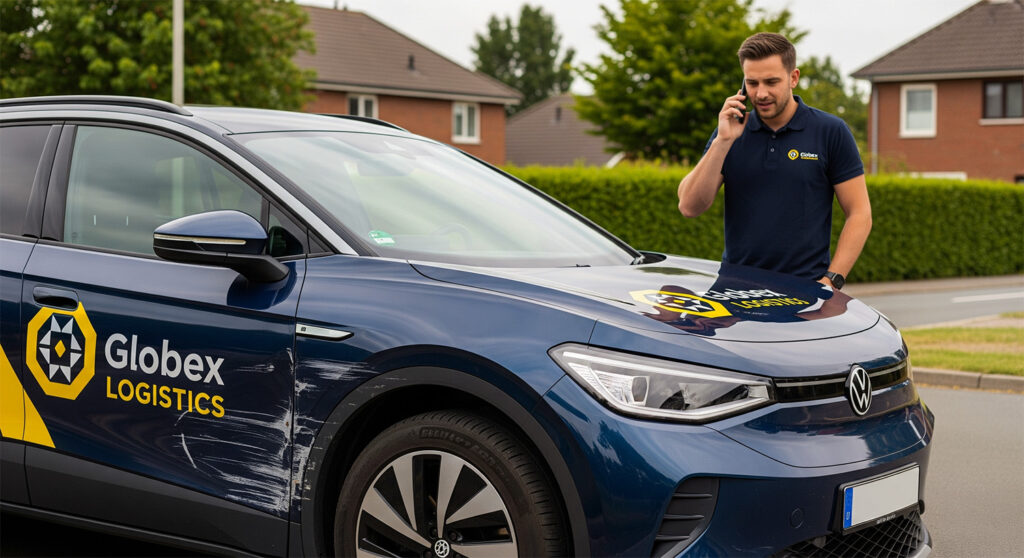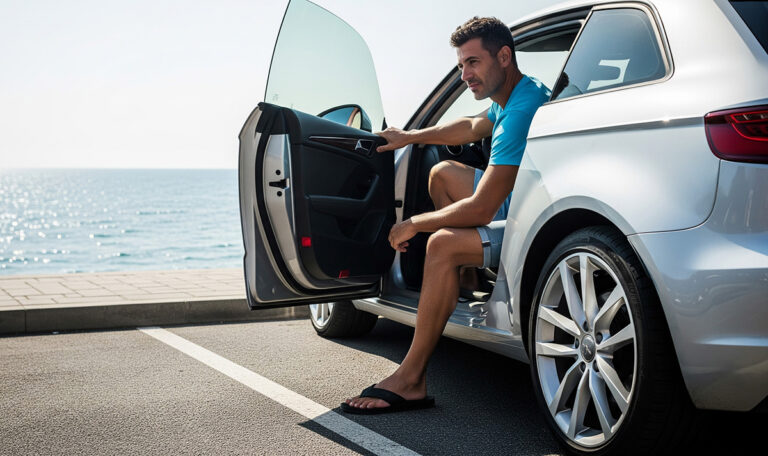If an accident occurs with the company car during a business trip, in most cases the employer or their insurance will pay - provided the accident was not caused by gross negligence or intent. Depending on the degree of fault, however, the employee may be held liable proportionately or even in full.
We explain when which party pays, what role insurance cover plays - and why private journeys can be particularly tricky.
- Who has to pay for the damage after an accident with the company car depends largely on whether the driver is at fault.
- In the event of an accident through no fault of your own or slight negligence, you do not have to expect any costs.
- In the event of medium or serious negligence, you must pay at least a proportion of the costs yourself. The same applies to wilful intent.
- Pay particular attention to whether private journeys with company cars are permitted.
Accident with company car - What now?
Many drivers are sure that their employer will have to pay for the damage incurred if they get into an accident with their company or company car or even cause it. However, this is not clearly regulated by law. In the following, we explain why you need to differentiate between a business trip and a private trip and show you who is liable in each case.
You should definitely acquire this valuable knowledge, because in certain constellations your accident with the company car can even lead to dismissal without notice.
Accident victims like you get the best support from fairforce.one.
Have your accident reported now free of charge and without obligation by our regulation specialists.
Who is liable and who pays in the event of an accident with the company car during working hours?
Who has to pay for the damage if there is an accident with the company car during working hours? The decisive factors are a) the question of fault and b) the degree of negligence.
As a general rule, the more at fault you are for the accident, the more you will have to pay in compensation. The rest is usually covered by your employer's liability insurance.
4 important tips on who pays in the event of an accident with a company car
Firstly, you must distinguish between four situations: You were not at fault or there was slight, moderate and gross negligence.
- Wear no guilt If you are not involved in the accident, the liability insurance of the person responsible for the accident must pay for the damage caused. You do not have to pay anything.
- If, due to slight negligenceIf you cause an accident, such as a slight speeding offence, you cannot be penalised as an employee.
- With medium negligenceFor example, if you make a mistake in giving way, you as an employee are often held liable and have to bear a proportion of the damage. However, it depends on the exact accident situation. The employer usually pays the rest. The greater your own fault in the accident with the company car, the higher the contribution you will have to pay. If the vehicle is fully comprehensive insured, you will usually be required to pay the excess.
- With gross negligence or even wilful misconduct, you as the employee and driver of the company car must always pay the full amount of the damage. Gross negligence exists, for example, if you are driving under the influence of alcohol. However, if the amount of damage greatly exceeds the amount of your income, you as an employee only have to pay proportionately. The legislator wants to protect you from financial ruin with this regulation.
The Federal Labour Court ruled back in 1987 in case no. 8 AZR 66/82 that an employee does not have to bear the increased risk of damage just because the employer has not taken out fully comprehensive insurance for the company car.
This regulation only applies if the accident occurs during working hours on a business trip or if your private trip was authorised by your employer.
How is my company car actually insured?
Good to know: Do you know how the company car is insured? As the vehicle owner, your employer is obliged to take out liability insurance for the company car. Often there is also fully comprehensive insurance for the company car. The excess costs are usually between 500 euros and a maximum of 1,000 euros.
Tip: Ask your employer as soon as possible about the existing insurance cover - comprehensive insurance yes/no - and the agreed excess amounts.
Who is liable in the event of an accident while travelling privately in a company car?
This depends on whether you have contractually agreed private use with your employer and expressly authorised it. By definition, you always use the company car privately if the journeys are not for the tasks specified in the employment contract.
If private use of the company car is permitted, the employer's insurance will normally cover the costs in the event of a road accident.
If private use is not permitted, you will also be liable for any damage resulting from the traffic accident in the event of an offence.
Is an accident with the company car a reason for dismissal?
It gets really tricky for you if you have used the company car for a private journey without authorisation and then caused an accident. But can this also lead to dismissal?
If you use the company car for private purposes without authorisation, this is initially a breach of contract that can also result in a warning. Your employer can actually also dismiss you for this unauthorised journey. However, if private use is authorised, the same rules apply as if you had been on a business trip.
To avoid disputes later on, we recommend that you contractually regulate the use of the company car by means of a vehicle transfer agreement.
Employees who travel a lot on the road for work should drive particularly carefully. In the event of an accident, they not only jeopardise themselves and other road users, but also their own job.
Steps towards fair claims settlement
Call us now free of charge at 0800 - 30 111 60 or have your claims checked directly online!
At fairforce.one, we give you the assurance that your matter will be examined and competently resolved for you exclusively by proven, customer-orientated traffic and insurance law specialists.
Contact us with just a few clicks and we will help you further. The fairforce.one network will enforce your claims and support you personally in all matters right through to full payment.
This is exactly why we founded fairforce.one. And that's exactly what has made us Germany's road accident settlement portal with the best customer ratings.
Frequently asked questions about accidents with company cars
Who pays for the damage in the event of an accident with the company car during working hours?
As a rule, the employer covers the damage via the company insurance - at least in the case of slight negligence. In cases of medium or gross negligence, the employee may be liable in full or in part.
learn moreWhat applies in the event of an accident while travelling privately in a company car?
If private use is authorised, the same rules apply as for a business trip. If the use was not authorised, the driver is liable in the event of damage - possibly even in full.
learn moreDo I always have to pay myself in the event of an accident with the company car?
No. Only in cases of medium or gross negligence do employees have to expect a share or full assumption of the costs. In the case of accidents not caused by negligence or slight negligence, the employer's insurance will cover the damage.
learn moreWhat happens if the employer has not taken out comprehensive insurance?
According to the Federal Labour Court, the employee must not suffer any disadvantage as a result. If there is no fully comprehensive insurance, the employer must still pay - except in cases of gross negligence or intent.
learn moreCan an accident with the company car lead to dismissal?
Yes, if the company car has been used for private purposes without authorisation and an accident occurs, there is a risk of a warning or even termination without notice. The normal liability rules apply for authorised use.
learn more




